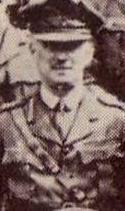David Campbell (British Army officer) facts for kids
Quick facts for kids
Sir David Campbell
|
|
|---|---|

General Sir David Campbell
|
|
| Nickname(s) | Soarer, Barbara |
| Born | 28 January 1869 |
| Died | 12 March 1936 (aged 67) |
| Allegiance | |
| Service/ |
|
| Years of service | 1889 - 1936 |
| Rank | General |
| Unit | 9th Queen's Royal Lancers |
| Commands held | 21st Division Baluchistan District in India Aldershot Command |
| Battles/wars | Second Boer War First World War |
| Awards | Knight Grand Cross of the Order of the Bath |
General Sir David Graham Muschet Campbell (1869–1936) was a brave cavalry officer in the British Army. He was also a talented amateur sportsman, especially in horse racing. Later in his life, he became the Governor of Malta.
Campbell's army career began in Britain and Ireland. His regiment, the 9th Queen's Royal Lancers, later moved to South Africa and then to India. He saw his first real action during the Second Boer War. When the First World War started, he was leading his regiment. He became famous for two cavalry charges, where he was seriously wounded in the second one. After the war, he continued to serve in important army roles and was knighted.
He was also a very successful jockey. He won several major horse races, including the famous Grand National in 1896. This win earned him the nickname "Soarer." He also enjoyed playing cricket and polo.
Contents
Who Was David Campbell?
Early Life and Joining the Army
David Campbell was born on January 28, 1869. His father was a Major in the Cameron Highlanders. David went to Clifton College, where he was known for his sports skills, especially in cricket.
After school, he attended the Royal Military College, Sandhurst, which is a famous army training school. He also played cricket for Sandhurst. In 1889, he officially joined the 9th Lancers as a second lieutenant. Joining the cavalry was quite expensive back then, requiring a good amount of personal money.
Life in the Cavalry
His regiment was first based in Manchester, England, and then moved to Ireland. During this time, the army made some changes to how cavalry regiments were organized. Campbell was promoted to lieutenant in 1890.
The regiment stayed in Ireland until 1894, when they moved to Aldershot. This period was described as very peaceful.
A Champion Jockey: The "Soarer"
Winning the Grand National
While serving in the army, David Campbell also became a very successful amateur jockey. He started winning races on a horse named The Soarer. He had actually gotten this horse by winning a coin toss!
His biggest victory came in 1896 when he won the Grand National at Aintree. This is one of the most famous horse races in the world. After this win, people started calling him "Soarer," which became his nickname.
Other Sporting Achievements
In 1896, he also won the Irish National Hunt Cup. He was also very good at polo, winning two major tournaments in the same year. This was a record that remained unmatched even after his death.
In 1897, he tried to win the Grand National again on The Soarer, but he fell and broke his collar bone. He continued to ride in military horse races throughout his army career.
Serving His Country: Military Career
The Second Boer War
In 1896, Campbell's regiment was sent to South Africa. They later moved to India in 1898. In 1899, he married Janet Mary Aikman. Soon after, he was called back to duty as his regiment prepared for the Second Boer War in South Africa.
He fought in several important battles, including Belmont and Modder River. He helped relieve the city of Kimberley, which was under attack. He was wounded in the Battle of Paardeberg but recovered and took part in the advance on Pretoria. For his bravery, he was promoted to the rank of major.
First World War Heroics
After the Boer War, Campbell continued to rise through the ranks. In 1912, he became the commander of his regiment, the 9th Lancers.
When the First World War began in 1914, he led his regiment in a daring cavalry charge at Elouges. Later, he was involved in one of the last "lance on lance" actions of the war. During this charge, he was seriously wounded by a revolver, a lance, and a sword. Despite his injuries, he famously told the doctor, "I've just had the best quarter of an hour I've ever had in my life!"
In November 1914, he was promoted to command the 6th Cavalry Brigade. Then, in May 1916, he was promoted again to lead the 21st Division. He remained in command of this division for the rest of the war.
After the Wars: Leadership and Governor of Malta
Important Army Roles
After the First World War, Sir David Campbell continued to hold important leadership positions in the army. In 1920, he became the General Officer Commanding (GOC) for the Baluchistan District in India.
He then served as the Military Secretary in 1926. From 1927 to 1931, he was the GOC of Aldershot Command, where he strongly supported the idea of making the army more modern with new machines and vehicles.
Governor of Malta
In 1931, Sir David Campbell was appointed Governor and Commander-in-Chief of Malta. This was a challenging time for him. There were political disagreements on the island between groups who supported Britain and those who supported Italy. To keep things stable, he had to take special actions to manage the island's government.
He resigned from his role in 1936 due to poor health and sadly passed away shortly after, on March 12, 1936. One of the houses at Saint Edward's College, a school in Malta, was named in his honor.

